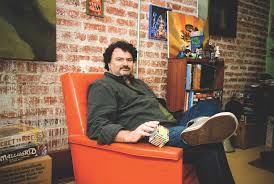This past summer, Double Fine’s Tim Schafer, inXile’s Brian Fargo, and Obsidian’s Feargus Urquhart, launched Fig, which focuses exclusively on games. The platform allows the reward-based component as a way of “proving out a market, de-risking investment, getting investors more excited.” If investors see fans supporting a project, they might be more willing to invest more on their side.
 Now, just less than six months since Fig’s launch, Schafer is ready to discuss his experience on Kickstarter. During a recent interview with Game Industry, he shared:
Now, just less than six months since Fig’s launch, Schafer is ready to discuss his experience on Kickstarter. During a recent interview with Game Industry, he shared:
“We had a great experience with Kickstarter, but there was this nagging question. I love the mission of Kickstarter in helping creative people get their works made, and that’s what backers want. But with games, especially games with higher budgets, the question is, ‘But what if this is a hit and makes a lot of money?’ Is it OK to make a lot of money when you got the initial money for free from someone. And how will they feel if you get rich off a game that wouldn’t exist without them?”
Despite past Kickstarter successes, Schafer believes that video games might not be achieving as much funds as they can through the crowdfunding platform:
“It seemed like we had hit a ceiling [on Kickstarter], a lot of games having trouble getting past a certain mark. With the investment portion of Fig, there’s a chance to go beyond that.”
Explaining other crowdfunding struggles, Schafer stated:
“People talk about crowdfunding fatigue and then a project like Exploding Kittens comes along and does really well and it’s like, I guess it just takes the right project. There’s fatigue for just doing the same thing over and over again, but that’s one of the reasons we looked to Fig, because it allows us to add the investment twist to it. With our first campaign, there was a period where we got a lot of hate mail because people thought we were just going to take their money and run and the project was a failure. But all we were doing was making the game even bigger and investing our own money to make that happen.
“I think slowly that kind of misinformation is being diluted with the truth, which is that we’ve now successfully crowdfunded two projects, shipped them both, the backers have them and they’re great games. I feel like people are starting to see we have a lot of credibility with crowdfunded projects.”
In regards to his video game history, Schafer added:
“It just seemed like everything had to align, what I was doing and what the team was doing. I’ve always wanted to iterate on a game I’ve made, but we’re usually doing something new… It’s not just the industry; I’ve just personally often had something else I’ve wanted to do. But this is one I’ve wanted to do for a long time. I’ve been keeping a Google doc open with ideas for it for like 10 years, just putting in every idea I have for a mental world that would be fun to visit. So it’s either make this game or that dam will burst.”


